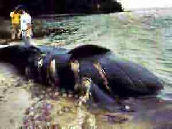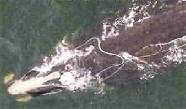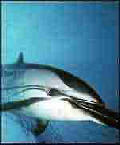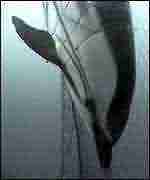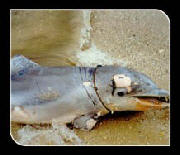|
Jared Blumenfeld, IFAW's habitat director, says, "Every old fishing net, discarded rope, or other piece of ghost gear that we pull out of the water is one less death trap for the remaining 300 North Atlantic right whales."
With $12,000 from IFAW, the project will be implemented by Massachusetts lobstermen with oversight from the Massachusetts Division of Marine Fisheries.
Up to seven fishing boats will be working over the next few weeks to clear fishing and lobster gear that is discarded, lost or otherwise illegally floating in Cape Cod Bay. The fishing boat crews will map locations of the ghost gear, and document the gear's identification numbers. If owners can be identified, the gear will be returned.
A representative from the Division of Marine Fisheries or the Massachusetts Environmental Police will be aboard each boat, to ensure that active gear is not disturbed.
Many animals and birds die as a result of contact with ghost gear. Here, a pelican is entangled in discarded fishing line.
|
